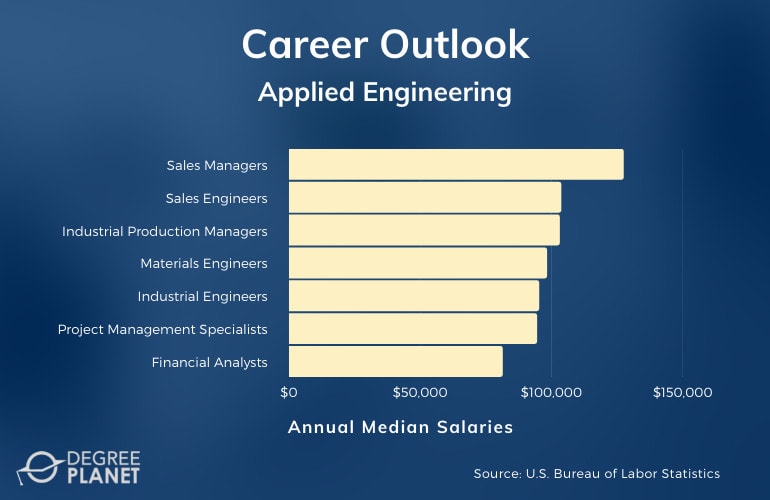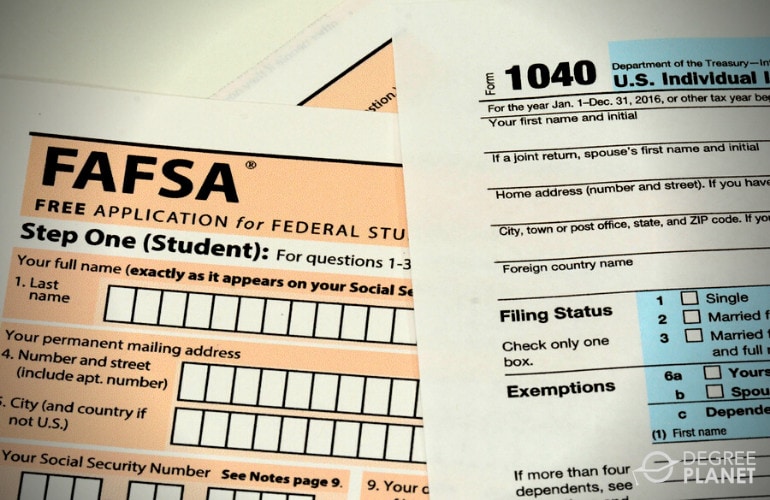If you are interested in computer science and structural analysis, you might consider an applied engineering degree.

Applied engineers use their abilities to design and manage complex systems. They often use their teamwork and industry-specific skills to become impactful leaders in their professional environments.
Editorial Listing ShortCode:
Professionals who complete a bachelor’s in applied engineering degree online program often find themselves working in a wide array of industries, including healthcare, architecture, and manufacturing.
Online Applied Engineering Degrees

A degree in applied engineering covers the technical skills and subject-specific knowledge necessary to become an advanced problem-solver and leader.
Much like an online associate’s in applied engineering, the focus of a bachelors in applied engineering online degree is on repairing, maintaining, and diagnosing complex systems. Applied engineers use their understanding of industry equipment to plan for and implement major improvements. Some also lead diverse teams and manage programs.
Skills developed in an applied engineering degree program could include:
- Program management
- Data analysis and collection
- Structural analysis
- Communication
- Teamwork
Although specific courses will always differ between schools, common topics covered in an applied engineering major include:
- Introduction to electronics
- Reliability and failure analysis
- Engineering materials and processes
- Mechanical systems
- English composition
- General chemistry
- Motors and controls
- Statistics
These courses are intended to provide you with the technical skills and academic knowledge needed to develop an advanced understanding of a wide range of systems. These systems can include mechanical, biomedical, electrical, and agricultural.
Editorial Listing ShortCode:
Applied engineering graduates may pursue professional positions such as:
- Process engineer
- Production engineer
- Maintenance engineer
- Installation specialist
Project management, communication, and teamwork skills are also useful in fields outside of engineering, such as sales management or financial analysis.
Applied Engineering Sciences Careers & Salaries

Applied engineering graduates often have the opportunity to work as leaders within civic institutions, creating change and having a positive impact on communities. Applied engineers work in a variety of industries, including the fields of transportation and aerospace technology.
According to the Bureau of Labor Statistics, professionals with a degree in applied engineering may pursue the following career paths.
| Careers | Annual Median Salaries |
| Sales Managers | $127,490 |
| Sales Engineers | $103,710 |
| Industrial Production Managers | $103,150 |
| Materials Engineers | $98,300 |
| Industrial Engineers | $95,300 |
| Project Management Specialists | $94,500 |
| Financial Analysts | $81,410 |
| Technical Writers | $78,060 |
| Training and Development Specialists | $61,570 |
| Industrial Engineering Technologists and Technicians | $60,220 |
Many of the potential careers related to a degree in applied engineering have median salaries that are higher than the national average for all other occupations. Although a degree in applied engineering can certainly lead to an above average salary and secure job position, it is never a guarantee.
Editorial Listing ShortCode:
Your personal connections, work experience, degree specialization, and individual skill set can all impact the professional positions available to you.
Bachelor of Applied Engineering Curriculum & Courses

An applied engineering curriculum should cover the basics in multiple disciplines, including physics, humanities, mathematics, and chemistry.
Coursework may include:
- Introduction to Electronics: This course provides a foundation in basic electronics theory, covering key components like diodes, integrated circuits, and capacitors.
- Reliability and Failure Analysis: This course teaches you how to use data to answer questions of reliability and predict the dependability of various systems—covering areas such as systems reliability analyses, descriptive statistics, and physics of failure.
- Engineering Materials and Processes: Focusing on different types of materials, this course includes topics like bonding and crystal structure, intrinsic properties, and thermal properties.
- Mechanical Systems: This course is an introduction to the fundamentals of mechanical physical properties, so you’ll study energy transformations, communication technologies, and hydraulic systems.
- English Composition: In this class, you’ll have the opportunity to develop your writing abilities, communicate ideas clearly, and conduct research.
- General Chemistry: In this course, you’ll cover the basic principles of chemistry, including solutions, atomic and molecular structure, and thermodynamics.
- Motors and Controls: This course is designed to develop your understanding of electrical control diagrams, motor controls, and control circuits.
- Statistics: This course is a foundational course in statistics, so you will cover key concepts such as regression, inference, and confidence intervals.
- General Physics: Combining fundamental physics concepts with a laboratory requirement, this class explores material properties, waves, and mechanics.
- Circuits: You’ll cover topics necessary to build an in-depth knowledge of circuits, including voltage, maximum power transfer, and current.
Your program should also help you develop a working knowledge of current tools and engineering systems. This information is instrumental for professionals in applied engineering management.
Admissions Requirements

In addition to an application fee, you’ll often be asked to submit a number of personal items as well.
Most college applications require:
- SAT or ACT scores (only if required)
- Personal essay
- Official transcripts
- Letters of recommendation
While your academic record is certainly important, it is not the only way to demonstrate your value as a candidate. Exceptional recommendation letters and a relevant, thoughtful essay can help you appeal to admissions teams.
Accreditation

An accredited school is one that has been recognized for providing educational services that meet or surpass national or regional standards.
Accrediting agencies are responsible for evaluating an institution and determining whether it meets or exceeds these predetermined standards. You should be able to find each school’s accreditation status on their website. The US Department of Education has a list of accredited schools as well.
Editorial Listing ShortCode:
Engineering programs can also receive programmatic accreditation by the Accreditation Board for Engineering and Technology (ABET). Attending a regionally accredited program can impact your educational success, future job opportunities, and financial aid eligibility.
Financial Aid and Scholarships

Financial aid and scholarship opportunities are available to qualifying students from many different socioeconomic backgrounds. Submitting the Free Application for Federal Student Aid (FAFSA) will determine how much federal financial aid you are eligible to receive based on several personal factors, such as total household income.
If you are hoping to receive scholarship money to help with your tuition costs, there’s a wide range of options available. Colleges can offer unique scholarship programs in any number of categories, including academic, military, and community service.
What Is Applied Engineering and Technology Management?

Applied engineering and technology management is a field of study that intends to prepare you for work as a design engineer or technologist. You have the opportunity to select a concentration within the field of applied engineering, such as construction management, robotics and controls systems, or graphic communication.
Some of your coursework will be dedicated to expanding your expertise and knowledge in your chosen area. In addition to your chosen area of focus, you may also take courses that cover the skill sets and responsibilities of management and leadership roles.
Is Applied Engineering a Good Major?

Yes, applied engineering is a good major for many undergraduate students. Graduates often go on to have a positive impact on a company or community through their work.
Additionally, many applied engineering careers are experiencing employment growth at a rate faster than the national average. Industrial engineers, for example, have a projected job growth rate of 14% over the next ten years (Bureau of Labor Statistics).
According to the Bureau of Labor Statistics, the median wage for architecture and engineering occupations is $79,840, which is well above the national average. Steady employment growth rate, high salary, and the challenging nature of engineering work results in many professionals finding stability and satisfaction in this field.
What Can I Do with an Applied Engineering Degree?

One of the benefits of an applied engineering degree is its versatility. This degree path can lead to opportunities in a diverse range of industries, including robotics, electronics, and aviation.
Many applied engineering graduates go on to become industrial engineers, responsible for creating the systems that drive production of a product. Others choose to put their communication skills to work as sales engineers, selling scientific products to businesses.
An applied engineering degree also tends to offer a number of concentrations to choose from. Selecting a concentration that aligns with your career goals can help you gain the necessary skill sets for your industry of choice.
Can I Get an Engineering Degree Online?
Yes, it is possible to earn your engineering degree online. Online bachelors in engineering courses tend to be more accessible than in-person options.
Editorial Listing ShortCode:
Your program might let you review the material at any time, as lessons are often available for playback. Additionally, you won’t have to worry about commuting to school, which may allow for extra time to study or work. On the other hand, engineering is a very hands-on degree. Attending a brick-and-mortar program may help you gain this kind of firsthand experience and develop a deeper connection to the material.
How Long Does It Take to Get a Bachelors in Applied Engineering Degree Online?

If you attend school full-time and follow a traditional, 16 week semester, you can typically complete a bachelors degree in 4 years. Staying enrolled year-round and following an 8 week semester may help you graduate in even less time. Year-round enrollment includes taking courses over the summer as well.
There is no right or wrong timeline to follow when it comes to earning your bachelor’s degree in applied engineering. For instance, some students choose to earn their degree part-time, which requires more time to finish but allows more schedule flexibility.
What’s the Difference Between a Degree in Applied Engineering vs. Engineering?
Applied engineering can be more application-oriented than engineering, focusing on implementing rather than innovating.
- Engineering: Engineering deals with developing new processes. This degree has a more theoretical and mathematical approach to learning.
- Applied engineering: Applied engineering often deals with applying new processes. This degree has a more hands-on and technical approach to learning.
An engineering degree allows you to focus on a broad or specific engineering field, such as electrical, mechanical, or civil. An applied engineering degree focuses on the technical components of product development within the sectors of engineering.
Is an Applied Engineering Bachelors Degree Worth It?

Yes, an applied engineering bachelors degree is worth it for many students. It is possible to tailor your degree to fit your career aspirations. Selecting a concentration within applied engineering allows you to develop the necessary skill sets for the industry of your choice.
Editorial Listing ShortCode:
Many applied engineering graduates go on to accept challenging and collaborative jobs that allow them to grow professionally. On top of an intellectually stimulating work environment, many applied engineers enjoy higher than average salaries and excellent benefits. In addition, the Bureau of Labor Statistics projects 6% job growth for architecture and engineering occupations over the next ten years.
Universities Offering Online Bachelors in Applied Engineering Degree Program
Methodology: The following school list is in alphabetical order. To be included, a college or university must be regionally accredited and offer degree programs online or in a hybrid format.

Bemidji State University offers a BAS in Applied Engineering. Some courses are available online, but at least 38 credits must be completed on campus or be transferred from another school. The program is designed to be a good fit for those who have already earned associate degrees from community colleges.
Bemidji State University is accredited by the Higher Learning Commission.

DeVry University offers a Bachelor’s in Engineering Technology. The program is available 100% online, and courses are 8 weeks long. Students in the program are required to complete 126 credit hours of coursework. Courses include Introduction to Technology and Information Systems, Introduction to Programming, Fundamentals of Information Technology and Networking, and more.
DeVry University is accredited by the Higher Learning Commission.

East Carolina University offers an Industrial Technology BS program. This is a part-time program in which students typically enroll in one or two courses at a time. The program offers 8 different concentrations, including Mechanical Technology, Architectural Technology, Health Information Technologies, Bioprocess Manufacturing, and more.
East Carolina University is accredited by the Southern Association of Colleges and Schools Commission on Colleges.

Embry-Riddle Aeronautical University offers a Bachelor of Science in Engineering Technology. This flexible program is available completely online. Students in the program are required to complete research projects and virtual labs to gain hands-on skills. The program offers 9 different concentrations, including Unmanned Aerial Systems, Security and Intelligence, Project Management, Occupational Safety and Health, and more.
Embry-Riddle Aeronautical University is accredited by the Southern Association of Colleges and Schools Commission on Colleges.

Jacksonville State University offers a Bachelor of Science in Industrial Leadership. Coursework includes Manufacturing Cost Analysis, Statistical Analysis for Quality Control, Managing Engineering Technology, Industrial Organization and Function, and more.
Jacksonville State University is accredited by the Southern Association of Colleges and Schools Commission on Colleges.

Lamar University’s BS in Industrial Engineering is a 2+2 online program for students who have already completed freshman and sophomore coursework on campus or at another school. The degree can be completed mostly online. It does require one weekend visit to campus for a lab.
Lamar University is accredited by the Southern Association of Colleges and Schools Commission on Colleges.

Southeast Missouri State University offers an online program for a Bachelor of Science in Applied Technology. It is designed to build onto the knowledge gained from an associate degree program. The curriculum emphasizes real-world problem-solving. Students are provided with many elective options to customize their degrees. Course options include Statistical Process Control, Industrial Safety, Engineering Economic Analysis, and more.
SEMO is accredited by the Higher Learning Commission’s Commission on Institutions of Higher Education.

Southern Illinois University offers a Bachelor of Science in Industrial Management and Applied Engineering that can be earned entirely online. The curriculum is broad so that graduates can pursue careers in a variety of industries. Students may enroll part-time, and they can begin in the fall, spring, or summer semesters.
SIU is accredited by the Higher Learning Commission.

The University of Southern Mississippi offers an online program for a Bachelor of Science in Industrial Engineering Technology. Coursework includes Global Supply Chain Management, Plant Layout and Material Handling, Motion and Time Study, Industrial Simulation and Modeling, and more. Graduates have a 95% job placement rate.
The University of Southern Mississippi is accredited by the Southern Association of Colleges and Schools Commission on Colleges.

Wenatchee Valley College offers a Bachelor of Applied Science in Engineering Technology that is geared toward students who have already earned relevant associate degrees. This is a full-time program that includes a combination of online and face-to-face learning. Most students can finish in 2 to 3 years.
Wenatchee Valley College is accredited by the Northwest Commission on Colleges and Universities.
Getting Your Applied Engineering Bachelor’s Degree Online

If you’re interested in a hands-on career in applied engineering and production, you may want to start with obtaining your applied engineering bachelor’s degree online.
An applied engineering program provides the opportunity to develop your technical skills and theoretical knowledge in a specific concentration within the field. In addition to industry knowledge, you’ll likely graduate with stronger communication skills and a substantial understanding of what it takes to be a good leader.
You can start your educational journey today by researching online applied engineering programs from accredited colleges and universities.

